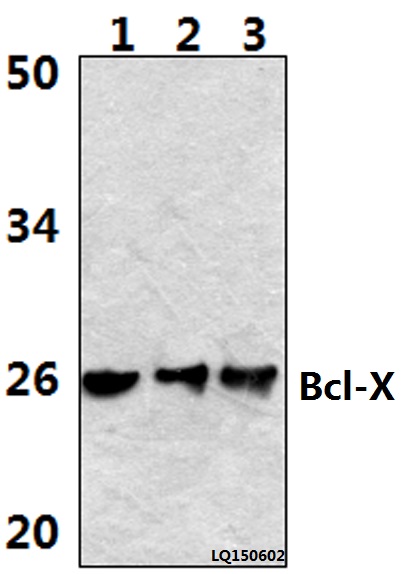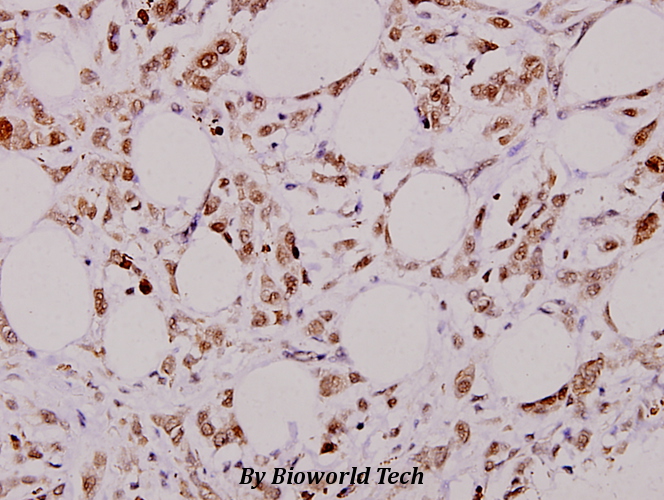Product Name :
Bcl-X (S56) polyclonal antibody Background :
Overexpression of Bax accelerates apoptotic death induced by cytokine deprivation in an IL-3-dependent cell line, and Bax also counters the death repressor activity of Bcl-2. Bcl-x, one of several additional proteins with sequence homology to Bcl-2, is expressed as Bcl-xL, a 233 amino acid protein with 43% sequence identity with Bcl-2 that suppresses cell death, and Bcl-xS, a shorter variant that is 178 amino acids in length and lacks a 63 amino acid region (amino acids 126-188) found in Bcl-xL and which functions as a dominant inhibitor of Bcl-2. A further apoptosis-inducing protein, Bad, dimerizes both with Bcl-xL and to a lesser extent with Bcl-2, thus displacing Bax and inducing apoptosis Product :
Rabbit IgG, 1mg/ml in PBS with 0.02% sodium azide, 50% glycerol, pH7.2 Storage&Stability :
Store at 4°C short term. Aliquot and store at -20°C long term. Avoid freeze-thaw cycles. Specificity :
BCL-X (S56) polyclonal antibody detects endogenous levels of BCL-XL protein, and also detects Isoform Bcl-XS (19 KDa). Immunogen :
Synthetic peptide, corresponding to amino acids 50-100 of Human Bcl-X. Conjugate :
Unconjugated Modification :
Unmodification
Bcl-X (S56) polyclonal antibody Background :
Overexpression of Bax accelerates apoptotic death induced by cytokine deprivation in an IL-3-dependent cell line, and Bax also counters the death repressor activity of Bcl-2. Bcl-x, one of several additional proteins with sequence homology to Bcl-2, is expressed as Bcl-xL, a 233 amino acid protein with 43% sequence identity with Bcl-2 that suppresses cell death, and Bcl-xS, a shorter variant that is 178 amino acids in length and lacks a 63 amino acid region (amino acids 126-188) found in Bcl-xL and which functions as a dominant inhibitor of Bcl-2. A further apoptosis-inducing protein, Bad, dimerizes both with Bcl-xL and to a lesser extent with Bcl-2, thus displacing Bax and inducing apoptosis Product :
Rabbit IgG, 1mg/ml in PBS with 0.02% sodium azide, 50% glycerol, pH7.2 Storage&Stability :
Store at 4°C short term. Aliquot and store at -20°C long term. Avoid freeze-thaw cycles. Specificity :
BCL-X (S56) polyclonal antibody detects endogenous levels of BCL-XL protein, and also detects Isoform Bcl-XS (19 KDa). Immunogen :
Synthetic peptide, corresponding to amino acids 50-100 of Human Bcl-X. Conjugate :
Unconjugated Modification :
Unmodification
-
 Western blot (WB) analysis of Bcl-X (S56) polyclonal antibody at 1:500 dilution Lane1:Hela whole cell lysate(40ug) Lane2:Hela treated with H2O2 (100nmol/ml, 25min, phostop) whole cell lysate (40ug) Lane3:Hela treated with H2O2 (100nmol/ml, 25min, λ-ppase) whole cell lysate (40ug)
Western blot (WB) analysis of Bcl-X (S56) polyclonal antibody at 1:500 dilution Lane1:Hela whole cell lysate(40ug) Lane2:Hela treated with H2O2 (100nmol/ml, 25min, phostop) whole cell lysate (40ug) Lane3:Hela treated with H2O2 (100nmol/ml, 25min, λ-ppase) whole cell lysate (40ug) -
 Immunohistochemistry (IHC) analyzes of Bcl-X (S56) pAb in paraffin-embedded human breast carcinoma tissue at 1:100.
Immunohistochemistry (IHC) analyzes of Bcl-X (S56) pAb in paraffin-embedded human breast carcinoma tissue at 1:100.
Sorafenib Induces Growth Inhibition and Apoptosis of Human Chondrosarcoma Cells by Blocking the RAF/ERK/MEK Pathway
PMCID: Pubmed No.:20812347
Plumbagin inhibits cell growth and potentiates apoptosis in human gastric cancer cells in vitro through the NF-κB signaling pathway
PMCID: Pubmed No.:22231395
Apple polysaccharides induce apoptosis in colorectal cancer cells.
PMCID: Pubmed No.:22470124
Effects of PEG-liposomal oxaliplatin on apoptosis, and expression of Cyclin A and Cyclin D1 in colorectal cancer cells.
PMCID: Pubmed No.:22710431
LYG-202 Augments Tumor Necrosis Factor-α-induced Apoptosis Via Attenuating CK2-dependent Nuclear Factor-κB Pathway in HepG2 Cells
PMCID: Pubmed No.:22909797
LYG-202 Augments Tumor Necrosis Factor-α-induced Apoptosis Via Attenuating CK2-dependent Nuclear Factor-κB Pathway in HepG2 Cells
PMCID: Pubmed No.:22909797
MicroRNA miR-491-5p Targeting both TP53 and Bcl-XL Induces Cell Apoptosis in SW1990 Pancreatic Cancer Cells through Mitochondria Mediated Pathway
PMCID: Pubmed No.:23519249
Salvianolic acid A preconditioning confers protection against concanavalin A-induced liver injury through SIRT1-mediated repression of p66shc in mice
PMCID: Pubmed No.:23993977
Melatonin treatment induces interplay of apoptosis, autophagy, and senescence in human colorectal cancer cells
PMCID: Pubmed No.:24484372
Bone marrow microenvironment confers imatinib resistance to chronic myelogenous leukemia and oroxylin A reverses the resistance by suppressing Stat3 pathway
PMCID: Pubmed No.:24671465
Smilax China L. rhizome extract inhibits nuclear factor-κB and induces apoptosis in ovarian cancer cells.
PMCID: Pubmed No.:25511428
LYG-202 exerts antitumor effect on PI3K/Akt signaling pathway in human breast cancer cells
PMCID: Pubmed No.:26153346
Activation of the SIRT1/p66shc antiapoptosis pathway via carnosic acid-induced inhibition of miR-34a protects rats against nonalcoholic fatty liver disease
PMCID: Pubmed No.:26203862
Alpinetin inhibits lung cancer progression and elevates sensitization drug-resistant lung cancer cells to cis-diammined dichloridoplatium
PMCID: Pubmed No.:26604699
Imbalanced expression of Bcl-xL and Bax in platelets treated with plasma from immune thrombocytopenia
PMCID: Pubmed No.:26712345
Smilax China L. rhizome extract inhibits nuclear factor-κB and induces apoptosis in ovarian cancer cells.
PMCID: Pubmed No.:25511428
Alpinetin inhibits lung cancer progression and elevates sensitization drug-resistant lung cancer cells to cis-diammined dichloridoplatium
PMCID: Pubmed No.:26604699
Imbalanced expression of Bcl-xL and Bax in platelets treated with plasma from immune thrombocytopenia
PMCID: Pubmed No.:26712345
Melatonin treatment induces interplay of apoptosis, autophagy, and senescence in human colorectal cancer cells
PMCID: Pubmed No.:24484372
Bone marrow microenvironment confers imatinib resistance to chronic myelogenous leukemia and oroxylin A reverses the resistance by suppressing Stat3 pathway
PMCID: Pubmed No.:24671465
PCPA protects against monocrotaline-induced pulmonary arterial remodeling in rats: potential roles of connective tissue growth factor
PMCID: Pubmed No.:29340081
MAPK/c-Jun signaling pathway contributes to the upregulation of the anti-apoptotic proteins Bcl-2 and Bcl-xL induced by Epstein-Barr virus-encoded BARF1 in gastric carcinoma cells
PMCID: Pubmed No.:29725459
Bioworld Biotech only provide peptides for our antibodies and do not provide additional peptide customization services.
Price/Size :
USD 368/1mg/vial
Tips:
For phospho antibody, we provide phospho peptide(0.5mg) and non-phospho peptide(0.5mg).Describe :
Blocking peptides are peptides that bind specifically to the target antibody and block antibody binding. These peptide usually contains the epitope recognized by the antibody. Antibodies bound to the blocking peptide no longer bind to the epitope on the target protein. This mechanism is useful when non-specific binding is an issue, for example, in Western blotting (WB) and Immunohistochemistry (IHC). By comparing the staining from the blocked antibody versus the antibody alone, one can see which staining is specific; Specific binding will be absent from the western blot or IHC performed with the neutralized antibody.Formula:
Synthetic peptide was lyophilized with 100% acetonitrile and is supplied as a powder. Reconstitute with 0.1 ml DI water for a final concentration of 10 mg/ml.The purity is >90%,tested by HPLC and MS.
Storage:
The freeze-dried powder is more stable. For short time at 2-8°C. For long term storage store at -20°C.
Note :
This product is for research use only (RUO only). Not for use in diagnostic or therapeutic procedures.
 Bcl-X (S56) polyclonal antibody
Bcl-X (S56) polyclonal antibody  Datasheet
Datasheet COA
COA MSDS
MSDS SHIP
SHIP